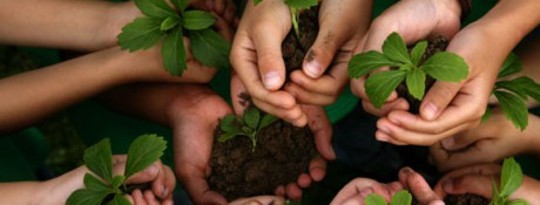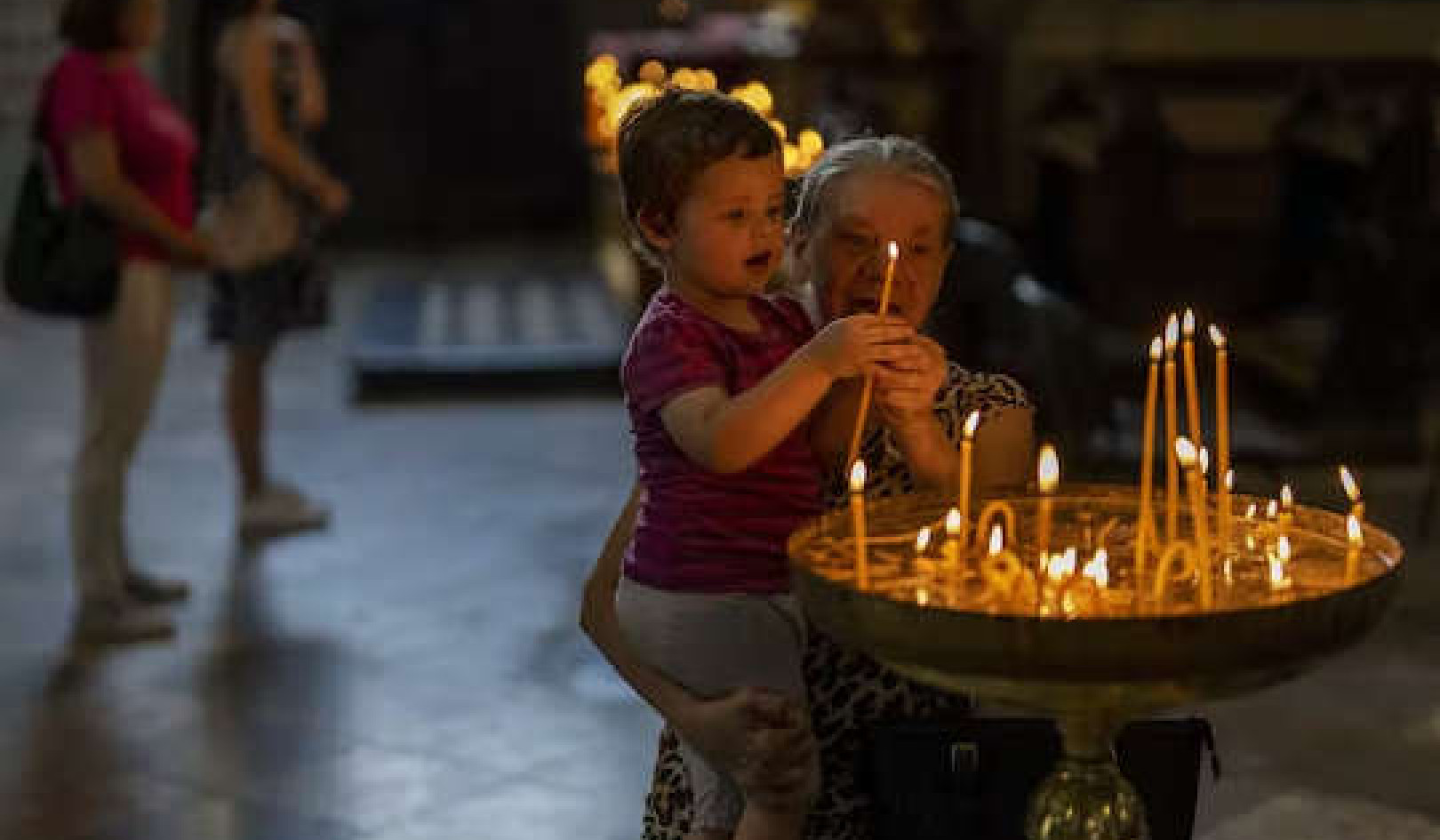
The people of the Bible, including some of their teachers and prophets, were farmers and shepherds. This means that the God they worshiped was daily encountered as the life-giving power at work in soils, plants and animals. God's love and provision were not abstract but could be tasted in the grain transformed into bread and the grapes fermented into wine.
Is it any wonder, then, that God should be described as the Gardener and as the Good Shepherd? Should we be surprised that these people understood paradise as a garden of delight called Eden?
Understanding Where We Are: The Garden of God
Many of our current ecological problems are the result of our inability to understand the world as God's "creation." We do not see our world as the expression of God's abiding and sustaining love, and so do not appreciate how our ways of living might reflect a refusal or violation of that love. Looking at the world around us, what many see instead is a realm named and narrated as "nature," a realm that has little intrinsic or sacramental value.
The heart of our problem is that when we look out upon the world we see a stockpile of "natural resources" rather than a manifestation of God's love, provision and concern. We approach the world with an instrumental frame of mind, thinking about it in terms of what it can do for us, rather than with a theological orientation, thinking about how creatures play an important role in God's overarching concern for a healthy and reconciled world.
If we are to live better in this world we need to appreciate that where we are is the garden, or farm, of God. If we want to address problems such as climate change, soil erosion, deforestation, desertification, species extinction, the pollution of our waters and the abuse of animals — all problems that spring from the same distorted vision and understanding — then we need to recover a strong sense of God's presence as the Gardener and Farmer of the world. To be followers of God is to pledge to be participants in God's life-building ways.
From Shopper... to Gardener & Stewart of the Land
Our primary mode of engagement with the world is not as gardeners but as shoppers. In our quest for cheap and copious amounts of food, we have created a culture of agribusinesses that destroy land, degrade plants, animals and farm workers, and are a major source of greenhouse gases. Of course, it would be a major mistake to view all the developments in medicine, sanitation, communication and transportation as bad. But when politicians and economists routinely tell us that the overriding goal of societies is to grow their economies because without such growth our high standard of life will come to an end, we need to think again.
Whether or not this "standard" of life is appropriate or justifiable is hardly ever discussed. Meanwhile we continue to pump carbon into the atmosphere, creating climate patterns that will bring devastation to our fields, forests, glaciers and oceans, and that will wreak havoc with our food systems and coastal communities.
Moving Forward: "Till and Keep" the Garden
 Will we commit to participate in God's gardening and farming work in the world, and then make this commitment practical by turning some of the grounds of churches, synagogues and mosques into gardens that both feed others and make our neighborhoods more beautiful?
Will we commit to participate in God's gardening and farming work in the world, and then make this commitment practical by turning some of the grounds of churches, synagogues and mosques into gardens that both feed others and make our neighborhoods more beautiful?
Will we accept our divinely given identity and vocation to "till and keep" the garden that this world is? Are we prepared to love God by loving the world brought into being and daily maintained by God's love?
Clearly gardening is not an option for all. But I do think that we have a responsibility — precisely because we eat and make food choices every day — to purchase food that reflects a gardener's priorities and cares. In other words, even if we may not garden ourselves, we have the daily opportunity as individuals and faith communities to encourage and support those who grow food in a way that honors God and nurtures the health of fields, plants and animals. When we learn that industrial food production contributes as much as 20 to 30 percent of today's greenhouse gases, we will also see that growing good food in an ecologically responsible way will go a long way toward healing creation.
The Need in Faith Communities: Shift Our Thinking & Actions At The Most Basic Levels.
Given the scope and speed at which our ecosystems are being destroyed, and given the unprecedented challenge of meeting the long list of social and ecological problems associated with climate change, there clearly is a pressing need for coordinated efforts among faith communities, nonprofits, scientists, business leaders and governmental bodies. We need international agreements to reduce the emission of heat-trapping gases, just as we need binding commitments to stop the erosion of our soils and the pollution of our waters.
These efforts, however, will not find the encouragement they need or be sustained if we do not change the attitudes and expectations that have brought us to this point. We cannot continue to treat the world as an inexhaustible store or warehouse that exists for our own satisfaction.
We need to shift our thinking and acting at the most basic levels.
The Healing of the World: Learning To Nurture & Protect Our Garden
The healing of the world begins with the healing of the places where we live and the nurture of the soil from which we eat. It is as we learn to love our home places that we will see how precious the diverse home places of the world are. Learning to nurture and protect our own gardens, we will see how vital it is that all the world's gardens be healthy and whole.
Gardening work creates the conditions in which solidarity with all the world's eaters can develop. This is solidarity that begins with our love of the soil and then expands into love for all the creatures that grow out of it and are fed by it. There has never been a time when the need for solidarity was more urgent.
©2012 by Mallory McDuff. All rights reserved.
Reprinted with permission of the publisher,
New Society Publishers. http://newsociety.com
This article was adapted with permission from the Chapter 5 of the book:
Sacred Acts: How Churches are Working to Protect Earth's Climate
edited by Mallory McDuff.
 From evangelicals to Episcopalians, people of faith are mobilizing to confront climate change. Sacred Acts documents the diverse actions taken by churches to address climate change through stewardship, advocacy, spirituality, and justice. Contributions from leading Christian voices such as Norman Wirzba and the Reverend Canon Sally Bingham detail the work of faith communities. Sacred Acts shows that churches can play a critical role in confronting climate change — perhaps the greatest moral imperative of our time. This timely collection will inspire individuals and congregations to act in good faith to help protect Earth's climate.
From evangelicals to Episcopalians, people of faith are mobilizing to confront climate change. Sacred Acts documents the diverse actions taken by churches to address climate change through stewardship, advocacy, spirituality, and justice. Contributions from leading Christian voices such as Norman Wirzba and the Reverend Canon Sally Bingham detail the work of faith communities. Sacred Acts shows that churches can play a critical role in confronting climate change — perhaps the greatest moral imperative of our time. This timely collection will inspire individuals and congregations to act in good faith to help protect Earth's climate.
Click here for more info and/or to order this book.
About the Author
 Norman Wirzba, Ph.D. is the research professor of theology, ecology and rural life at Duke Divinity School, as well as research professor at the Nicholas School of the Environment and Earth Sciences at Duke University. He is the author of books that include Food and Faith: A Theology of Eating and The Paradise of God: Renewing Religion in an Ecological Age. (For more information about Norman Wirzba.)
Norman Wirzba, Ph.D. is the research professor of theology, ecology and rural life at Duke Divinity School, as well as research professor at the Nicholas School of the Environment and Earth Sciences at Duke University. He is the author of books that include Food and Faith: A Theology of Eating and The Paradise of God: Renewing Religion in an Ecological Age. (For more information about Norman Wirzba.)
























